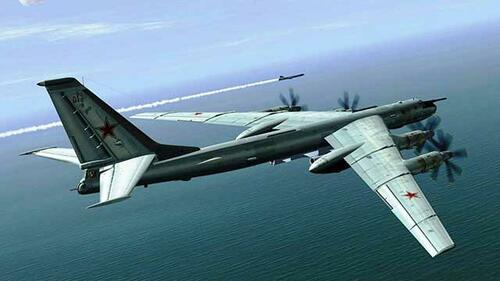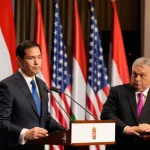
Russia's defense ministry (MoD) on Tuesday announced and confirmed a rare joint patrol of Russian and Chinese military planes over the Pacific region. It came as President Joe Biden is in Tokyo meeting with counterparts from Japan, Australia and India, or the 'Quad' members. Japan's government has condemned the provocative patrol which reportedly did not breach its airspace as "unacceptable".
"The joint patrol lasted 13 hours over the Japanese and East China seas and involved Russian Tu-95 strategic bombers and Chinese Xian H-6 jets," the MoD said as cited in Reuters. It further confirmed that for parts of the lengthy flight, Japanese and South Korean air force jets shadowed the Russian-Chinese patrol, which included nuclear-capable bombers.

No aerial incidents were reported as the rival aircraft shadowed the joint patrol, with the Russian MoD emphasizing the patrol wasn't aimed against any foreign state and that it took place in full accordance with international laws. It began over the Sea of Japan.
South Korean media reports that at one point the patrol breached S.Korea's air defense identification zone, which goes beyond its borders and is not strictly considered the country's "airspace".
The Japanese and South Korean jets were scrambled in response to the group of aircraft nearing their respective airspace. An unnamed US official responded to the provocative flight as follows:
A US official said the exercise showed China was continuing military co-operation with Russia in the Indo-Pacific "even as Russia brutalizes Ukraine". "It also shows that Russia will stand with China in the East and South China Seas, not with other Indo-Pacific states," the official said.

Based on details from Russia's military, state media has detailed the following aircraft making up the joint aerial deployment:
Russian Tupolev Tu-95MS (NATO reporting name: Bear) and Chinese Xian H-6 strategic bombers have successfully completed the 13-hour-long patrol during which the aircraft crossed over parts of the Sea of Japan (also known as East Sea) and the East China Sea. The Russian and Chinese bombers were covered along their path by Russia Air Force 4+ generation fighter jets Sukhoi Su-30SM (NATO reporting name: Flanker-H).
Further according to the report, "Seoul sent F-2 jets, while Japan deployed its F-15 fighters to escort the Chinese and Russian aircraft, which stayed away from the two nations' airspace."
🇷🇺🇨🇳🇰🇷 Combat planes from Russia and China entered South Korea's air defense zone without warning, reports Yonhap citing JCS. At least four Chinese and four Russian warplanes were seen.
— Wu Xiaoping (吴小平) (@SilingWu) May 24, 2022
Though their militaries indicated the patrol was part of the two countries' "annual military cooperation plan," it is the first such exercise to come amid boiling tensions with the US and the West over Russia's grinding war in Ukraine, now in its fourth month, and amid fears that China is quietly supporting Moscow.
I think this joint strategic patrol of China and Russia is aiming at the QUAD summit in Tokyo. Don't mess with China and Russia, especially don't mess with these two great powers at the same time. https://t.co/2JuLXVr2Vq
— Hu Xijin 胡锡进 (@HuXijin_GT) May 24, 2022
And crucially, just the day prior President Biden in a press Q&A said that the US would defend Taiwan militarily if the island comes under attack by China.
NEW - Biden says the US would defend #Taiwan militarily against an invasion by China. pic.twitter.com/xxXEj1o2PJ
— Disclose.tv (@disclosetv) May 23, 2022
...provocative comments which the White House quickly walked back, seeking to portray that the president 'misspoke' while affirming the 'One China' policy has not changed.
Russia’s defense ministry (MoD) on Tuesday announced and confirmed a rare joint patrol of Russian and Chinese military planes over the Pacific region. It came as President Joe Biden is in Tokyo meeting with counterparts from Japan, Australia and India, or the ‘Quad’ members. Japan’s government has condemned the provocative patrol which reportedly did not breach its airspace as “unacceptable”.
“The joint patrol lasted 13 hours over the Japanese and East China seas and involved Russian Tu-95 strategic bombers and Chinese Xian H-6 jets,” the MoD said as cited in Reuters. It further confirmed that for parts of the lengthy flight, Japanese and South Korean air force jets shadowed the Russian-Chinese patrol, which included nuclear-capable bombers.

No aerial incidents were reported as the rival aircraft shadowed the joint patrol, with the Russian MoD emphasizing the patrol wasn’t aimed against any foreign state and that it took place in full accordance with international laws. It began over the Sea of Japan.
South Korean media reports that at one point the patrol breached S.Korea’s air defense identification zone, which goes beyond its borders and is not strictly considered the country’s “airspace”.
The Japanese and South Korean jets were scrambled in response to the group of aircraft nearing their respective airspace. An unnamed US official responded to the provocative flight as follows:
A US official said the exercise showed China was continuing military co-operation with Russia in the Indo-Pacific “even as Russia brutalizes Ukraine”. “It also shows that Russia will stand with China in the East and South China Seas, not with other Indo-Pacific states,” the official said.

Based on details from Russia’s military, state media has detailed the following aircraft making up the joint aerial deployment:
Russian Tupolev Tu-95MS (NATO reporting name: Bear) and Chinese Xian H-6 strategic bombers have successfully completed the 13-hour-long patrol during which the aircraft crossed over parts of the Sea of Japan (also known as East Sea) and the East China Sea. The Russian and Chinese bombers were covered along their path by Russia Air Force 4+ generation fighter jets Sukhoi Su-30SM (NATO reporting name: Flanker-H).
Further according to the report, “Seoul sent F-2 jets, while Japan deployed its F-15 fighters to escort the Chinese and Russian aircraft, which stayed away from the two nations’ airspace.”
🇷🇺🇨🇳🇰🇷 Combat planes from Russia and China entered South Korea’s air defense zone without warning, reports Yonhap citing JCS. At least four Chinese and four Russian warplanes were seen.
— Wu Xiaoping (吴小平) (@SilingWu) May 24, 2022
Though their militaries indicated the patrol was part of the two countries’ “annual military cooperation plan,” it is the first such exercise to come amid boiling tensions with the US and the West over Russia’s grinding war in Ukraine, now in its fourth month, and amid fears that China is quietly supporting Moscow.
I think this joint strategic patrol of China and Russia is aiming at the QUAD summit in Tokyo. Don’t mess with China and Russia, especially don’t mess with these two great powers at the same time. https://t.co/2JuLXVr2Vq
— Hu Xijin 胡锡进 (@HuXijin_GT) May 24, 2022
And crucially, just the day prior President Biden in a press Q&A said that the US would defend Taiwan militarily if the island comes under attack by China.
NEW – Biden says the US would defend #Taiwan militarily against an invasion by China. pic.twitter.com/xxXEj1o2PJ
— Disclose.tv (@disclosetv) May 23, 2022
…provocative comments which the White House quickly walked back, seeking to portray that the president ‘misspoke’ while affirming the ‘One China’ policy has not changed.







